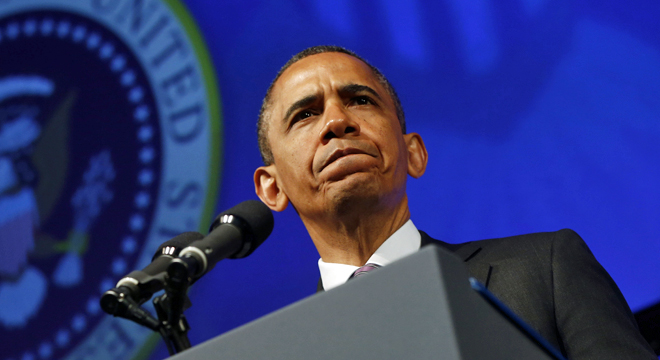Republicans haven’t been able to resist the temptation to link the IRS scandal to the Affordable Care Act, and use it to build support for mucking up or slowing implementation of the law.
IRS will administer key ACA revenue and subsidy provisions, and a major scandal at the agency offers the GOP a unique opportunity to question the wisdom of expanding its authority.
But some conservatives hope to draw a less direct, but in theory much more consequential, connection between Obamacare and IRS malfeasance — one which they hope will result in denial of benefits to millions of uninsured taxpayers, and perhaps the unwinding of the entire law.
The idea actually predates the IRS scandal by many months, and may soon be addressed by a federal court in Washington, D.C. Critics contend that under a literal interpretation of the statutory language of the Affordable Care Act, people in states that have refused to set up insurance exchanges — states that have thus ceded that power to the federal government — won’t be eligible for federal subsidies to purchase insurance.
Enter the IRS, which interpreted that language in its regulation-writing process as meaning that those people will in fact be eligible for insurance subsidies in every state, regardless of whether the exchange is state- or Washington-run.
Conservatives, and even some GOP lawmakers, contend the IRS’s interpretation was unlawful — and now they want to yoke their narrow reading of the law to the unrelated political non-profit controversy.
“The IRS has announced that it will violate the text of the law and issue health insurance subsidies through federal exchanges, something Congress did not authorize,” Senate Minority Whip John Cornyn (R-TX) said in floor remarks this week. “The law clearly states that these subsidies are not available to the federal exchange but only to the state-based exchanges. It’s the case that the President’s health care law will dramatically expand the power of the Internal Revenue Service because the agency is responsible for implementing so much of Obamacare’s most important provisions. Well, given what we’ve learned about IRS malfeasance, does that really sound like a good idea, to give them more responsibility, to hire more agents before we get to the bottom of the present scandal?”
The conservative hue and cry for pursuing this approach to undermining Obamacare is much quieter than the one that culminated in a landmark Supreme Court decision to uphold the law last year. That reflects a combination of factors: the argument’s weaker, the politics are much less straightforward, the complaint is aimed at benefits that nobody’s received yet. The IRS scandal could change that dynamic.
And though reform supporters don’t want to see this idea take flight in the media the way the novel theories underlying previous ACA challenges did, they don’t believe it’s persuasive enough to pose much of a danger to the law.
“If and when this gets to court, courts are going to look at this and say, well, this isn’t a very well-worded statute, but when you look at it as a whole, it’s clear that it intends federal exchanges to issue premium tax credits,” says Timothy Jost, a law professor at Washington and Lee University, and an ACA supporter.
Ironically, the conservatives who devised this argument cite a paper Jost wrote in 2009 to bolster their own claims. In it, he muses among many other things that Congress could theoretically deny insurance subsidies to federal exchanges on purpose, to incentivize states to erect them on their own. The implication is that Congress may have adopted Jost’s idea intentionally.
The legislative history of the ACA, along with its interpretation by government agencies, official analyses by the Congressional Budget Office, and the broad consensus of the members of Congress who wrote the law belies this notion. (Jost never endorsed the idea, either, and called the notion that he inspired or promoted it “weak.”)
The Congressional Research Service has looked at this issue closely, too. Its conclusion suggests that unless courts read the portion of the law at issue in isolation, and precisely as the laws opponents characterize it, then legal challengers will have a hard time denying subsidies to individuals via federal exchanges. The IRS’ interpretation of the statute would stand. And even that determination would probably have to wait until 2015, before which challengers will have a hard time demonstrating standing.
“By 2015, somebody will have standing to raise it, then I think the question will be are the courts really prepared to rescind tax credits for millions of Americans,” Jost said.
On top of all that, if individuals in states with federal exchanges are ultimately denied insurance subsidies, their lawmakers — most of them red-state lawmakers — would find themselves under immense pressure to fix the law, and quickly.
Why? Jost explains, “if a court would ever hold that the federal exchanges couldn’t issue premium tax credits, it would be a serious problem, because it would deprive millions of Americans of tax breaks and insurance, it would also weaken the individual mandate.”
So it’s an unlikely outcome that’s also a long way off. But the ideas adherents have been waiting for a chance to take it mainstream. The IRS scandal provides it to them.






